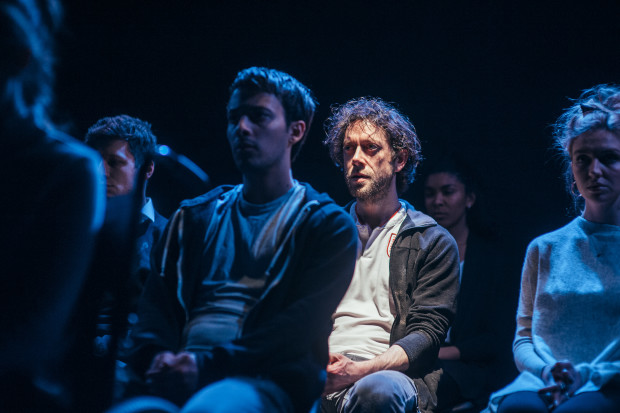You have no items in your cart. Want to get some nice things?
Go shopping
If you were to read in passing a synopsis of BU21 – a series of interlocking monologues by survivors of a horrific terrorist attack on London, inspired by real 7/7 testimonies – you would be justified in expecting a very different kind of play. Po-faced; humourless; the kind of worthy but dreary piece that Guardian readers flock to in order to reinforce their self-conception as dutiful citizens. You, however, would be wrong. Most artistic explorations of terrorism feel obliged to be dour, as if the subject matter commands this; to be otherwise would somehow be disrespectful. Stuart Slade, the writer of BU21, knows better. Groups such as ISIS aim to extinguish life, to douse the exuberant humanity of the West – so why not showcase the teeming life of the metropolis? Not for Slade, then, a lifeless lecture; instead, in this funny, absorbing and inventive play, he releases London’s rich and wonderful humanity like an immense jack-in-a-box.
Slade was discovered through Theatre503’s Rapid Write Response initiative; his previous play, Cans, a two-hander about a just-bereaved university student and her warm but deadbeat uncle, ran at the theatre in November 2014. That work was similarly playful, humane and engaged with society, but its social milieu was by nature confined. BU21, in contrast, draws the social net much wider: where Cans consisted of a cast of two relatives, BU21 has a cast of six Londoners of different backgrounds and ethnicities.
The setting, we come to understand, is a survivor’s group. Each member has been profoundly affected by a terrorist atrocity in which jihadis have crashed a plane into a residential street in Parsons Green; BU21 was the code name for the flight. There is Thalissa (Thalissa Teixeira), a PR executive who has just learned of her mother’s death on Twitter; Ana (Roxana Lupu), a waitress at Strada who suffers severe burns from the wreckage and is dubbed cruelly by one character as “the roasted Romanian”; Floss (Florence Roberts), a student who is in the kitchen making a sandwich when one of the passenger victims crash-lands in her garden; Graham (Graham O’Mara), a bedraggled lorry driver whose rousing call to arms at the scene of the attack has made him a national sensation; and Alex (Alex Forsyth), an amoral and libidinous City trader for whom the attack was a double blow: he lost both his girlfriend and his best friend, who turned out to have been in bed with each other at the time. Running parallel to these testimonies is Clive (Clive Keene), a young man raised in a secular Muslim household but at odds with his atheist father; we are kept guessing as to Clive’s significance, and, to Slade’s credit, the reveal is satisfying rather than banal.
The play shows that it is possible to be at once funny and searching: that a play exploring the grief and fallout of a terrorist attack need never once to be a slog. Indeed, at many times it is uproarious: Florence’s musing on the immense significance that biscuits take on at survivor’s groups (“Have as many biscuits as you like”); Alex’s outrageous wantonness as he contemplates pulling his girlfriend’s younger sister at her mother’s funeral (“the most legendary pull of all time”); Clive’s attempt to use anti-Muslim sentiment to his advantage to force an annoying passenger off a bus. But this humour is never flippant: indeed, by engaging us more with the play, it makes the emotional punch a lot harder. What’s more, BU21 raises real and provocative issues: how the class of the victims shapes reactions to the attack; the lengths we go to to be part of the new mood of national solidarity; how we all have vastly different coping mechanisms when it comes to moving on.
In addition to Slade’s script, Owen Crouch’s sound design is a real highlight, subtly underscoring the play’s themes with aeroplane sounds and an atmospheric bed. Dan Pick’s affecting but undemonstrative direction, meanwhile, allows the unformly excellent actors to shine. Graham O’Mara, Slade’s acting muse who previously had the male lead in Cans, is by now a master of a certain kind of hobo-philosopher role; Thalissa Teixeira has a real magnetism and gravity as Thalissa; Florence Roberts and Clive Keene both have a disarming wide-eyed guilelessness perfect for their characters; Roxana Lupu, refreshingly an actual Romanian, combines authenticity with a relentless optimism that is almost exhausting; and, perhaps the star of the show – and certainly that with the most difficult task – Alex Forsyth pulls a blinder with the role of Alex, infusing a character who could easily be insufferably hateful with a charisma and impish charm that makes the audience complicit. (Indeed, with his sunken eyes and broad nose, I was reminded, somewhat, of Boris Johnson, who uses a similar personal appeal to get away with a multitude of sins.)
The character of Graham has a recurring refrain as he reflects on his newfound status as a national hero: “Boy done good.” In the wake of this theatrical triumph, Stuart Slade would be right to tell himself the same. If there’s any justice, BU21 will have a longer life, in a similar fashion to Theatre503’s breakout success Land of Our Fathers, which transferred to the West End and is still touring regional playhouses after more than two years. That, it’s true, was a less London-centric play. But this play does not merely speak to Londoners; it speaks to anyone interested in humanity in all its richness, strangeness and ugliness. At the very least, Studio 2 of Trafalgar Studios ought to beckon, and Slade’s star will continue to rise. Boy done good. Boy done great.
BU21 continues at Theatre503 until April 9. Tickets are £15 (£12 concessions) and Pay What You Can on Sundays.





